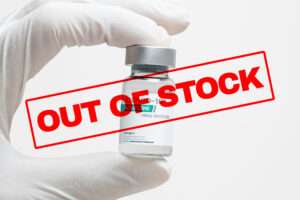Contact Us
- Solutions
- Resources
- About
- Contact Us
close
Optional callout banner for highlighted news or events
Learn More

Pharmaceutical companies are no strangers to challenges, but the ongoing drug shortages and supply chain issues have been particularly daunting. Even as the COVID-19 pandemic eases, these problems persist, with the American Society of Health-System Pharmacists (ASHP) reporting an all-time high of 323 active drug shortages in the first quarter of 2024.
More than 99% of hospital and health system pharmacists have reported experiencing drug shortages in 2023, and the difficulties won’t be going away anytime soon. Lingering supply chain shortages are expected to continue through the rest of 2024 and beyond. Below we discuss how partnering with a CDMO can help keep your pharmaceutical supply chain consistent.
Ensuring a consistent commercial supply is not just about business continuity; it’s a matter of patient safety. Delays in the availability of life-saving medications can lead to severe health consequences for patients, as hospitals are often forced to seek alternative drugs at higher costs. The American Hospital Association reported that in some cases of extreme drug shortages, these higher costs can compromise patient care.
Regulatory compliance is another critical factor driving the need for uninterrupted supply. The FDA has updated its policies, requiring pharmaceutical companies to notify them of any supply interruptions that could lead to disruptions. Failure to comply can result in fines and increased scrutiny, making a stable supply chain a regulatory necessity.
Maintaining continuous supply is also important for staying competitive. Supply chain interruptions can lead to a public relations crisis and damage brand reputation, which are as detrimental as operational cost increases. The more companies invest in smoother supply chain processes, the less risk they have of public debacles. Continuous commercial supply is also better for customer satisfaction, and on-time shipment is an important metric in building customer loyalty, according to Supply Chain Management Review. These branding perceptions are critical for pharmaceutical companies wanting to create a competitive advantage as well as build a foundation of reliability and trustworthiness.
Pharma companies should also invest in uninterrupted commercial supply for financial stability. A choppy supply chain forces companies to scramble for short-term solutions; organizations usually end up paying dearly to catch up. A report from Economist Impact shows that during supply chain crises, companies often suffer delayed cash flows, decreased productivity, and loss of sales and market share. Accenture agrees—supply chain disruptions cause decreases in operational efficiency and effectiveness, as well as reduced productivity.
To navigate these challenges and maintain operational efficiency and market competitiveness, it is crucial to understand the risks that can threaten supply chain stability.
1. Cyber security threats: The pharmaceutical industry is a prime target for cyberattacks due to the sensitive nature of patient data and proprietary drug formulations. An example of this vulnerability was the 2024 data breach at Cencora, a leading American drug wholesale and contract research organization. In February, Cencora reported to the California Attorney General's office that unauthorized data exfiltration had occurred. By April, it was confirmed that customer information had been compromised. This breach had extensive repercussions, affecting patients dependent on medications from over a dozen prominent pharmaceutical companies, including GSK, Bayer, AbbVie, and Novartis.

Unfortunately, Cencora is not a unique case. Cyber threats are a constant danger for pharmaceutical companies. In a survey by Economist Impact, 36% of respondents said that global cyberattacks had a significant disruptive impact on supply chain operations over the past three years. Additionally, pharmaceutical companies are at a higher risk of data breaches because the pharma industry frequently has mergers and acquisitions. Every time the data changes hands, there’s a risk of information being leaked.
2. Geopolitical situations: Geopolitical tensions are increasingly playing a disruptive role in pharmaceutical supply chains. A prime example of this is the BIOSECURE Act, passed by the U.S. House of Representatives in January 2024. This act prevents pharmaceutical companies in the U.S. from accessing federal funding for projects if they partner with China-based contract development and manufacturing organizations.
EY also reported that the pharmaceutical industry is experiencing trends of severe supply chain disruption because of geopolitical tensions, ranging from the COVID-19 pandemic to Russia’s invasion of Ukraine. As a result, the pharmaceutical industry is shifting toward regionalization, rebalancing supply chains to national security and interests.
3. Natural disasters: Events such as earthquakes, hurricanes, and pandemics can impact manufacturing and logistics. A key example of this is Pfizer’s Rocky Mount, NC, facility. In June 2023, a tornado caused severe damage to the facility, prompting them to change the way they operated their supply chain. They had an ongoing emergency request ordering process to manage the inventory of 14 medicines in high medical need. Pfizer also had to store non-production related materials, such as packaging components, in a new warehouse secured as a temporary replacement, which affected the company’s shipping.
Contract Development and Manufacturing Organizations (CDMOs) offer a strategic solution to the supply chain challenges faced by pharmaceutical companies. The last 13 years have seen a surge in outsourcing to CDMOs, a trend highlighted by Outsourced Pharma, primarily due to the supply chain resilience they offer.
One reason for the rise in popularity is that CDMOs have both primary and secondary sourcing. By maintaining both primary and secondary sourcing options, CDMOs ensure that if a primary supplier experiences problems, there’s an immediate backup ready to keep supply chains running smoothly. This flexibility is crucial, enabling companies to swiftly adapt to market shifts and customize services to meet their specific needs, much like having a versatile toolkit for any situation.

Beyond logistics, CDMOs foster innovation and collaboration. Their deep industry expertise allows them to navigate unforeseen challenges and propose creative solutions. They play a crucial role in risk management by guiding companies through complex regulatory landscapes, helping to prevent setbacks and avoid manufacturing pitfalls.
When looking for a CDMO to partner with, here are some top qualities to consider:
At Pharmaceutics International, Inc. (Pii), we tailor drug development solutions to fit your unique needs. Our expertise spans analytical, development, and manufacturing services, supporting your projects every step of the way.
Pii is always evaluating the market and the needs of its customers, which range from startups to larger pharmaceutical development organizations. Each customer has unique requirements, and Pii’s deep understanding of these needs allows them to implement new strategies. By fostering collaboration and innovation, Pii looks to reduce the risk profile of the program by driving supply chain efficiency.
At Pii, we also believe that strong relationships and regular interactions with our many Subject Matter Experts (SMEs) are key to effective risk management. These SMEs engage with partners to anticipate potential disruptions and obstacles that could hinder success. By acting as an extension of the customer’s enterprise, Pii’s SMEs proactively address issues before they impact the supply chain. This approach ensures that programs run smoothly and that any potential disruptions are mitigated.
To see how Pii can help you mitigate risk and ensure an uninterrupted supply chain, contact us today.
Like what you read? Share with your network: